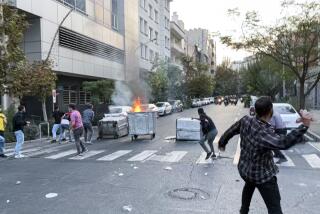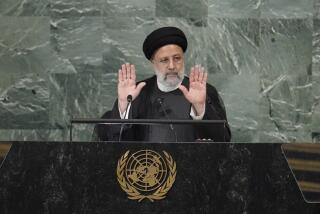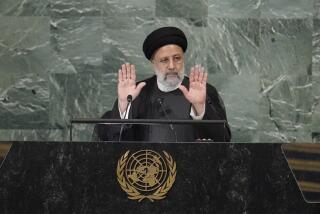Iran plays with wording on nuclear program
GENEVA — On the eve of a new round of talks, Iran’s foreign minister appeared to suggest a way Tehran and the West can finesse the touchy question of whether the Islamic Republic will continue to enrich uranium for its nuclear program.
Foreign Minister Mohammad Javad Zarif released a five-minute online video that describes the negotiations that begin Wednesday in Geneva as a “historic opportunity” and urges the West to participate with respect and equal treatment of Iran so that the talks will be successful.
In the video, posted Tuesday with subtitles in several languages, Zarif says in English that in Iran’s presidential election last June, “our people chose constructive engagement through the ballot box. And through this, they gave the world an historic opportunity to change course.”
The video, titled “Iran’s Message: There Is a Way Forward,” appears aimed at convincing foreign audiences that Iran wants a deal, and also at building support for the initiative at home.
The election has been widely interpreted as giving President Hassan Rouhani a mandate from Iranians to try to negotiate a deal that will ease the punishing Western sanctions on Iran’s economy in return for limits on a nuclear program that many countries believe is aimed at developing a weapons capability. Iran says its nuclear program is only for energy and other peaceful purposes.
Representatives of Iran and six world powers, including the United States, are believed to be close to a first-stage agreement. This week’s negotiations will be the third session in a little more than a month.
In comments Sunday, Zarif seemed to suggest that the world powers didn’t need to explicitly recognize what Iran claims to be its “right to enrich,” so long as they didn’t stand in the way of enrichment.
“We believe that Iran’s enrichment right is nonnegotiable and there is no necessity to recognize it as a right, because it is an inseparable right which should be respected by all sides,” Zarif said, according to the government-controlled Iranian Students News Agency.
He said the U.S. position on Iran’s assertion of its legal right “does not mean that they are against Iran’s enrichment.”
Iran says the Nuclear Nonproliferation Treaty gives countries a right to enrich, an assertion that the United States denies. U.S. officials haven’t ruled out giving Iran an international blessing for limited, peaceful uranium enrichment. They have said that if Iran takes the many steps required to assure the world it is not seeking a nuclear bomb, it could then bargain for such an authorization.
But if Iran continues to insist on a public acknowledgment of its “right” to enrich uranium, it would put the Obama administration in a bind and possibly threaten talks.
One diplomat said the six powers — the United States, Britain, France, China, Russia and Germany — might be able to provide a de facto blessing for Iranian enrichment, “but not de jure,” because several countries at the table don’t believe that the treaty provides that kind of legal authorization.
Iran ended the last round of talks insisting on public acknowledgment of this right, U.S. officials said.
In Washington, President Obama asked Senate leaders Tuesday to hold off on imposing new sanctions on Iran to give the negotiations a chance to work.
In a closed-door meeting at the White House that ran nearly two hours, Obama told lawmakers of both parties that the negotiations resuming this week represented the best chance of “stopping the advance of [Iran’s nuclear] program for the first time in nearly a decade,” Press Secretary Jay Carney said.
With Israeli Prime Minister Benjamin Netanyahu and pro-Israel groups lobbying heavily against the proposed deal, few lawmakers have been willing to publicly take the administration’s side. Yet it appears the White House will be getting some breathing room, at least until early December.
Sen. Bob Corker of Tennessee, ranking Republican on the Foreign Relations Committee, said after the meeting that some senators left the White House “very unsatisfied” with Obama’s case. Yet he ruled out the possibility that the Senate would vote for more sanctions before Monday, the start of a weeklong Thanksgiving recess.
Although Iran and Russia have been notably upbeat about the talks, U.S. officials have been more cautious, perhaps to avoid ratcheting expectations too high.
Secretary of State John F. Kerry, who said last week that the talks had been “extremely close” to reaching a deal, dialed that back Monday, saying he had “no specific expectation” on how the discussions would go this week.
The negotiations are expected to run through Friday, but could spill over to the weekend.
Times staff writer Richter reported from Geneva and special correspondent Mostaghim from Tehran. Times staff writer Shashank Bengali in Washington contributed to this report.
Washington contributed to this report.
More to Read
Sign up for Essential California
The most important California stories and recommendations in your inbox every morning.
You may occasionally receive promotional content from the Los Angeles Times.











